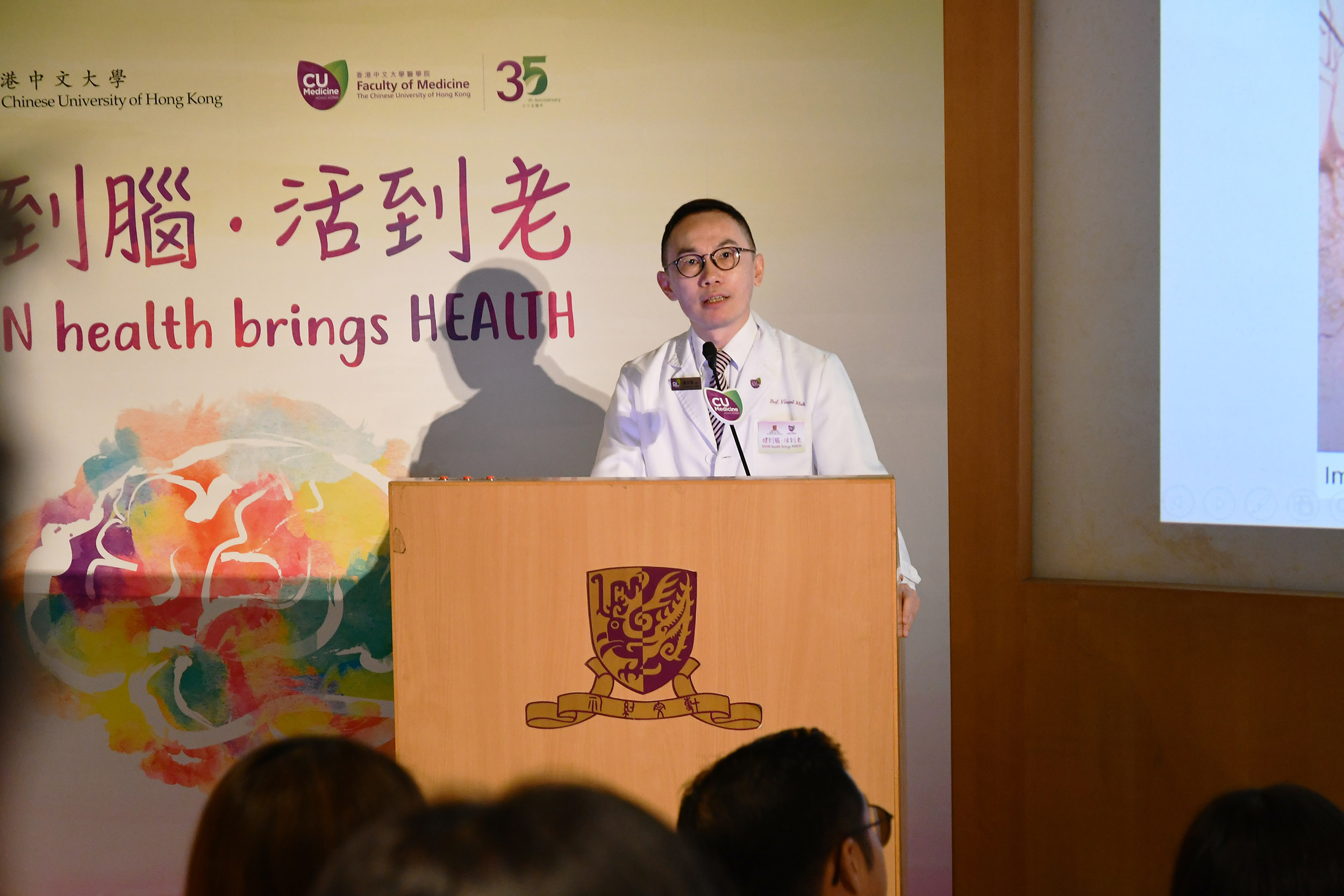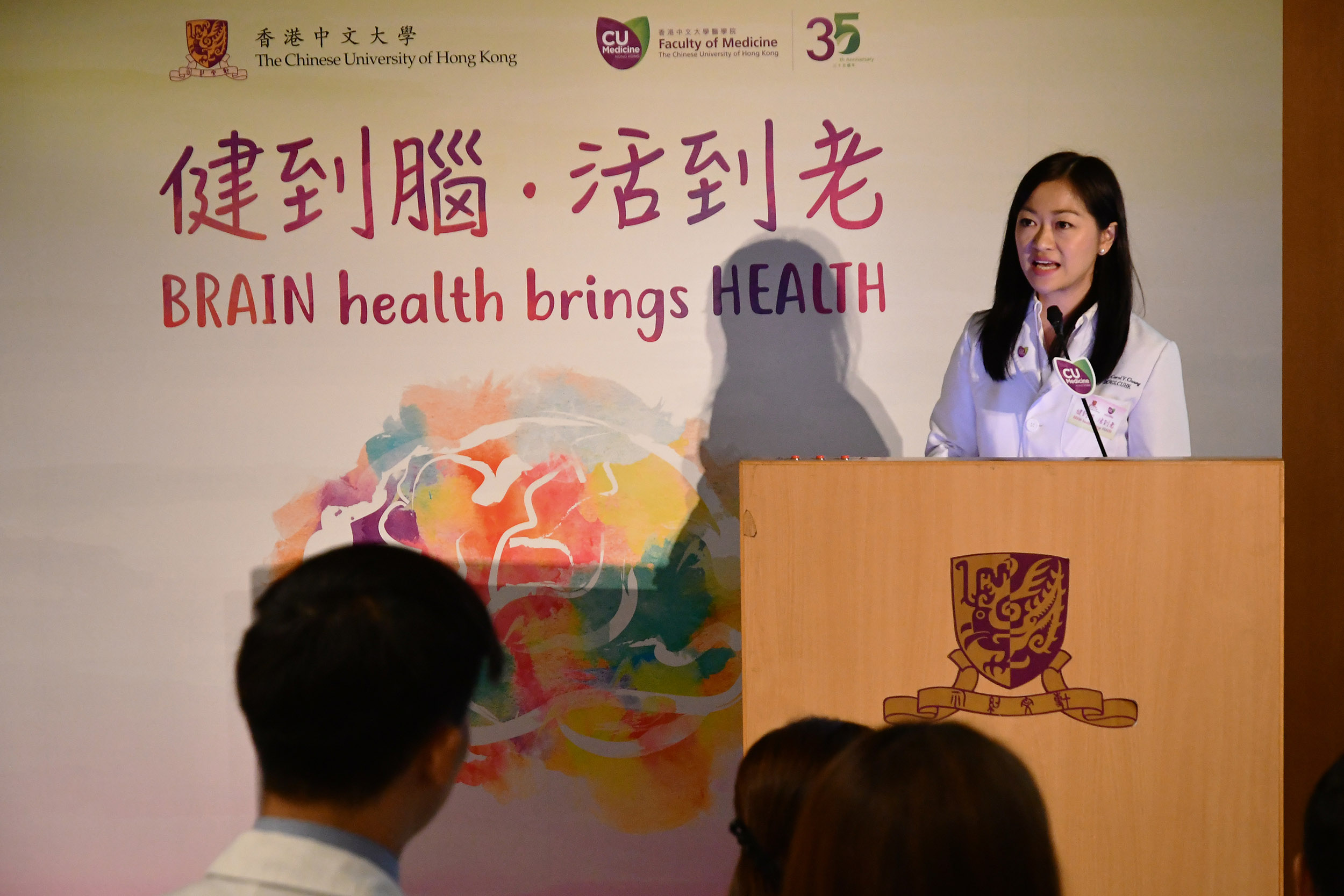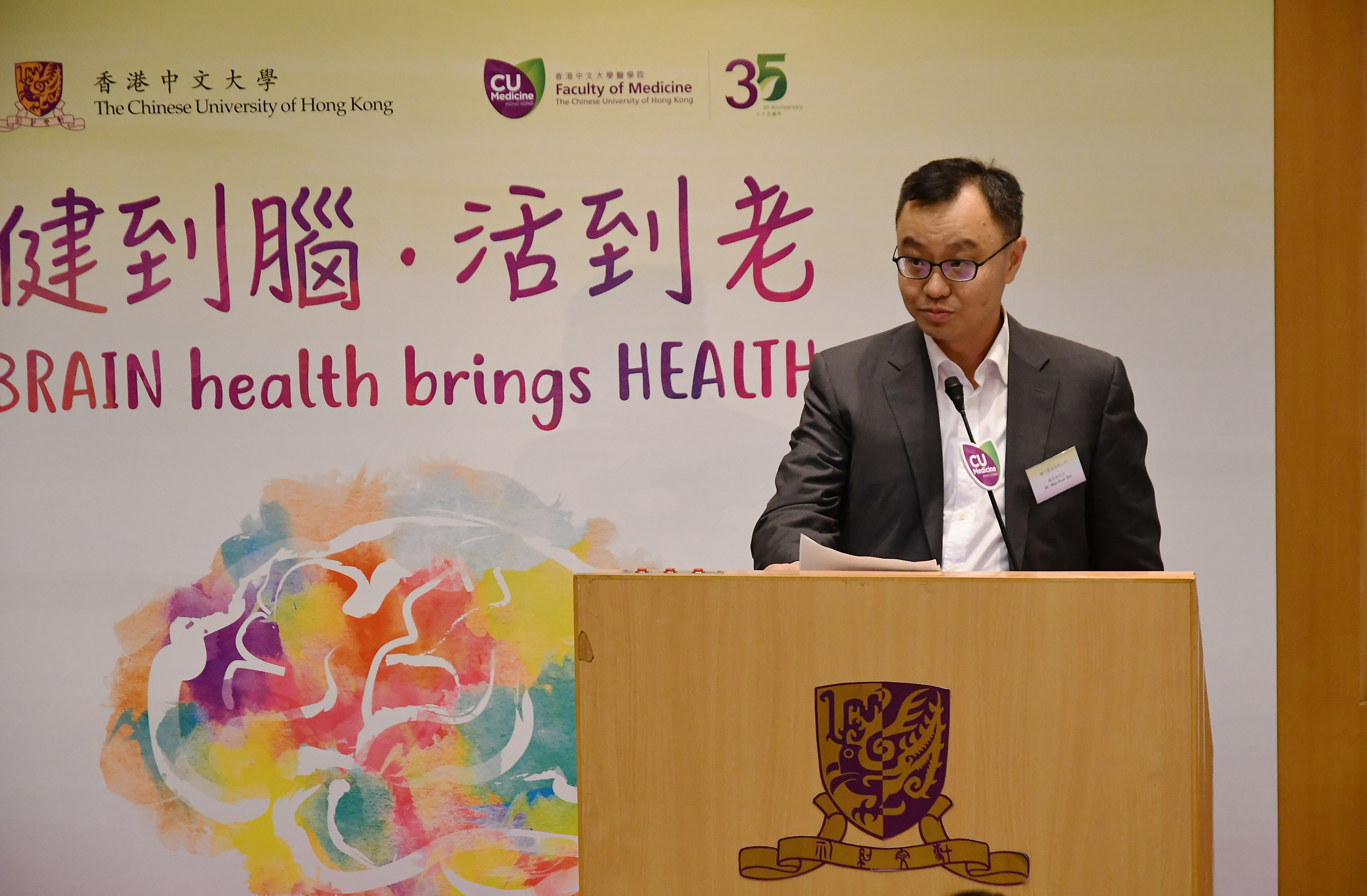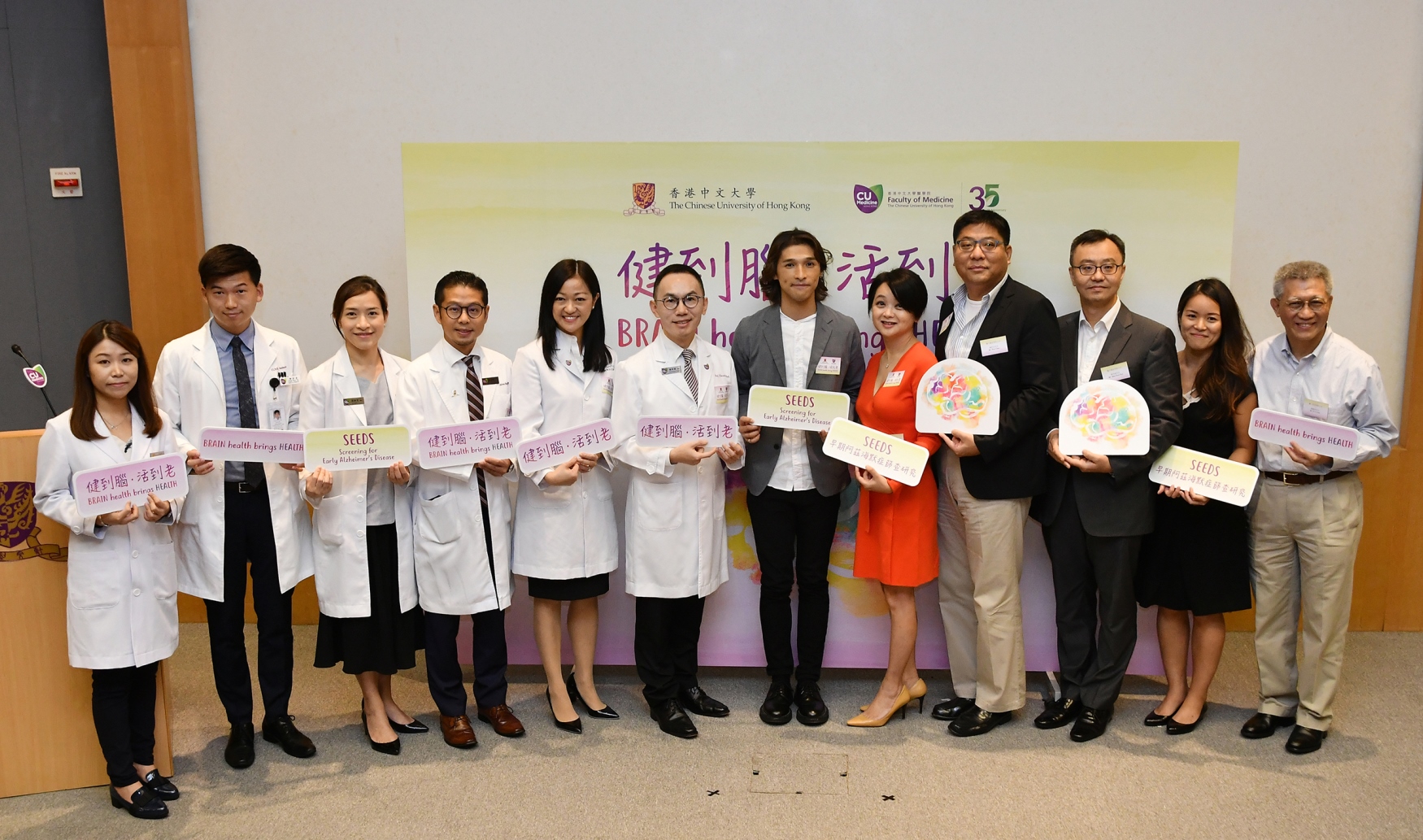CUHK Launches World’s First Study Utilizing Retinal Imaging
for Alzheimer’s Disease Screening in Chinese Population
Studies suggested that the treatment for Alzheimer’s Disease (AD, commonly known as senile dementia) may reduce the rate of cognitive decline if it is given when the disease is still at an early stage. However, current diagnostic investigations (e.g. PET) for early AD are not easily accessible. Under the support from Seeds Foundation Limited and the Health and Medical Research Fund (Food and Health Bureau), the Division of Neurology at the Department of Medicine & Therapeutics, Faculty of Medicine at The Chinese University of Hong Kong (CUHK), has launched the ‘Screening for Early AlzhEimer’s DiseaSe Study’ (SEEDS Study) to explore other methods (e.g. retinal imaging) for screening AD in Chinese population, so as to enhance detection of early AD. The SEEDS Study is a cross-departmental collaboration with the Department of Ophthalmology and Visual Science at the Faculty of Medicine of CUHK, together with Hong Kong Sanatorium & Hospital.
Treatment for AD lies on early detection - early intervention
In Hong Kong, 1 in 10 people who aged 70 or above suffers from dementia; while in elderly people who aged 85 or above, 1 in 3 has dementia. However, only 1 in 10 was diagnosed or has sought medical consultation.
Over half of dementia cases are linked with AD. It is associated with an excessive accumulation of abnormal protein - amyloid plaques and neurofibrillary tangles in our brains, leading to the death of brain cells and resulting in progressive cognitive decline.
Professor Vincent Chung Tong MOK, Head of Division of Neurology, Department of Medicine and Therapeutics, Faculty of Medicine at CUHK, stated, 'Recent studies suggested that anti-amyloid treatment may prevent further cognitive decline only if it is given when the disease is still at an early stage, i.e. mild cognitive impairment (MCI). The earlier we can detect, the earlier we can intervene when the disease is still mild. We hope to slow down or even stop the progression, and reduce the suffering from patients and the caregivers.'
SEEDS Study explores biomarkers and new investigations in Chinese population
Currently, diagnosing AD at an early stage requires the use of amyloid-PET scan or testing of cerebrospinal fluid collected via lumber puncture. Such investigations are not easily accessible and invasive. The objective of launching the SEEDS Study is to explore whether retinal imaging or blood biomarkers in the Chinese population can be used to screen for early AD.
Dr. Carol Yim Lui CHEUNG, Assistant Professor, Department of Ophthalmology & Visual Sciences, Faculty of Medicine, The Chinese University of Hong Kong, explained, 'The retina exists as an extension of central nervous system, offering a “window” to study cerebral microvascular and neurodegenerative damage. We have made significant progress in developing and applying retinal imaging as a non-invasive biomarker test to study microvascular and neuronal pathology in the eye and in the brain. The current proposed study would lead us to enhance the use of retinal imaging techniques in predicting who will develop cognitive decline in patients with AD or early dementia patients with MCI, as well as deeper understanding of early vascular dysfunction and neuronal injury in the pathophysiology of Dementia.'
100 subjects aged between 50 to 80 will be recruited to the SEEDS Study, including patients with mild cognitive impairment, AD dementia and subjects with normal cognition. The subjects will undergo a series of clinical assessments, including cognitive test, blood test, brain MRI and retinal imaging conducted by the research team at the Faculty of Medicine, CUHK. They will also undergo an amyloid-PET scan at Hong Kong Sanatorium & Hospital.
'Medical research is very crucial in the fight against disease and this is why I support my father joining the SEEDS Study. Even as a patient with dementia himself, it is meaningful to participate in research as a mean to fight against AD. I hope there will be no suffering from dementia in our next generation,' said Mr. You Nam WONG, Hong Kong artist and son of the first subject in the SEEDS Study. 'I hope the public can have higher awareness and better understanding of dementia, so as to prevent from it.'
Donor of the SEEDS Study, Mr. Mau Sum BUT, Board member of the Seeds Foundation Limited, shared, ‘3 years ago, the Seeds Foundation supported the research team from the Division of Neurology of CUHK in setting up the first research registry on early onset dementia in the Chinese population. It is encouraging to see what they have achieved. Knowing that the SEEDS Study focuses on early Alzheimer’s Disease, we decided to continue our support. We hope the study can result in simple and accessible screening tools for AD, so as to provide timely treatment for those who suffered.’
'Brain Health Brings Health' slogan to raise public awareness in brain health
A recent study published in The Lancet, one of the world's most influential medical journals, suggested that more than a third of dementia cases might theoretically be preventable. Preventive research and education are two main focuses of the Neurology team of CUHK. The team is now advocating 'Brain Health Brings Health', with the hope to raise public awareness and participation in maintaining a healthy lifestyle beneficial to the brain.
Incidence of dementia and other neurological diseases, such as stroke, Parkinson's disease, epilepsy are increasing with an ageing population. In Hong Kong, cerebrovascular disease and dementia ranked the 4th and 8th in the top 10 major causes of death, respectively. The CUHK team hope their work can help end, slow down progression and reduce suffering or disability brought by neurological diseases, not only for the Chinese population, but also patients from around the world.
中大開展全球首個以「視網膜影像」篩查華人阿茲海默症研究
有研究指治療阿茲海默症(俗稱「老人認知障礙症」)須在患者發病初期開始才有效,然而,現時本港能夠診斷早期阿茲海默症的檢測並不普遍。為使篩查早期阿茲海默症的檢測更快捷、經濟和普及,香港中文大學(中大)醫學院在種子基金有限公司及醫療衞生研究基金(食物及衞生局)支持下,與養和醫院合作展開「早期阿茲海默症篩查研究」(SEEDS Study),以探討華人阿茲海默症的生物標記 (biomarkers) 作認知障礙症檢測。
愈早檢測 愈早介入認知障礙症治療
早年中大研究發現,本港70歲以上長者每10人便有1位認知障礙患者,而85歲以上則每3人便有1位患者。患者中只有十分一人曾經求醫或已確診。
認知障礙症患者超過一半成因是阿茲海默症(Alzheimer’s disease),他們的腦部會積聚不正常的物質–澱粉狀蛋白及神經纖維纏結,導致腦細胞逐漸死亡,從而引致漸進式的認知退步。
中大醫學院內科及藥物治療學系腦神經科主任莫仲棠教授表示:「有研究指,抑制澱粉狀蛋白的治療或能防止認知能力進一步下降,關鍵在於患者須在很早期,例如在輕度認知障礙 (MCI) 階段接受治療才有效。愈早發現,我們便可以愈早介入治療,從而減慢甚至遏止病情繼續惡化,減輕病人及家屬的痛苦。」
尋找華人專屬的生物標記 開拓新檢測方法
現時,診斷早期阿茲海默症需要使用澱粉狀蛋白-正電子腦掃描 (amyloid-PET scan) ,或通過腰椎穿刺提取腦脊液進行檢測。不過此等檢測方法不普及並具入侵性。有見及此,中大腦神經科團隊希望透過開展「早期阿茲海默症篩查研究」(SEEDS Study) ,通過視網膜影像技術及血液測試,尋找及確認以篩查華人獨有的阿茲海默症生物標記,以開拓新的檢測方法。
中大醫學院眼科及視覺科學學系助理教授張艷蕾博士解釋:「視網膜是中樞神經的延伸,讓我們可透過眼睛這個『窗口』去觀察腦內血管和神經退化的損害。我們已成功研發及應用不具入侵性的視網膜影像技術來獲取生物標記,協助了解眼和腦內的血管及神經病變。而透過是次SEEDS研究,我們希望更進一步了解早期血管功能障礙及腦神經創傷對認知障礙症的病理影響,以助篩查阿茲海默症及早期認知障礙症患者。」
「早期阿茲海默症篩查研究」現招募100位年齡介乎50歲至80歲人士參與,當中包括輕度認知障礙患者、嚴重阿茲海默認知障礙症患者及認知功能正常人士。參加者將進行各項臨床檢測,包括由中大醫學院研究團隊進行的認知能力測試、血液測試、腦部磁力共振掃描和視網膜影像檢查,以及於養和醫院進行澱粉狀蛋白-正電子腦掃描。
作為首位參與此研究計劃的病人家屬,香港藝人黃又南先生表示:「醫學研究在對抗疾病時發揮極重要作用,所以我讓父親參與研究。雖然他現在是認知障礙症患者,但仍有機會為治療這病出一分力。我也希望其他患者、家屬以及公眾對此症有更多認識,並懂得預防,減低日後患病的機會。」
研究協作單位種子基金有限公司董事畢茂森先生表示:「種子基金三年前資助中大腦神經科團隊成立『早發性認知障礙症』研究登記冊,成果令人鼓舞。今年得知他們計劃進行早期的阿茲海默症研究,決定再次支持,讓阿茲海默症的診斷變得準確並普及,讓患者及早得到適切的治療。」
倡議「健到腦・活到老」 呼籲大眾管理腦健康
全球權威醫學期刊《刺針》於上月發表研究,指百分之三十的認知障礙症其實可以預防。除了預防性研究,教育亦是中大腦神經科團隊的工作重點,團隊倡議「健到腦・活到老」教育口號,提示公眾多注意「腦健康」。
隨著人口老化,腦科疾病(包括認知障礙症、中風、柏金遜症、腦癇症)的患者數目將急劇上升,在香港十大主要死因中,腦血管病及認知障礙症分別位列第四及第八位。中大腦神經科團隊期望他們的工作能遏止、延緩退化及減輕由腦疾病帶來的痛苦或殘障,為華人,以至全球腦疾病患者帶來好消息。









